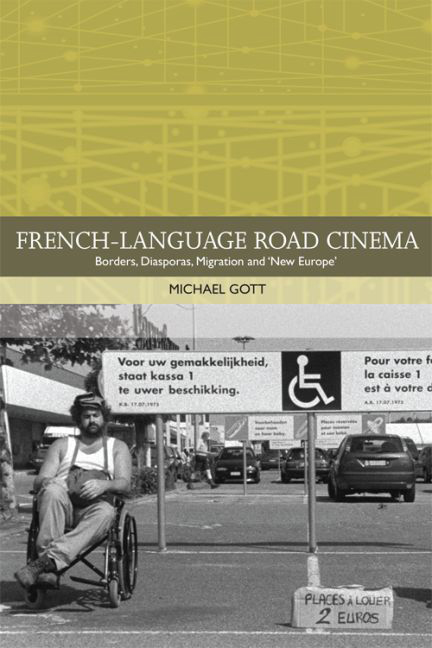Book contents
- Frontmatter
- Contents
- Acknowledgements
- List of Illustrations
- Traditions in World Cinema
- Introduction
- 1 Mapping the Hybrid European Road: French Connections, European Traditions and American Influence?
- 2 Remapping the European Road
- 3 Cowboys, Icebergs, Anarchists and Toreadors: The Paradoxes and Possibilities of the Francophone Belgian Road Cinema
- 4 Travelling Beyond the National: Mobile Citizenship and Flexible Identities in French-language Return Road Movies
- 5 The End of the Road? Dark Routes and Urban Passageways
- Conclusion
- Works Cited
- Index
Introduction
Published online by Cambridge University Press: 12 September 2017
- Frontmatter
- Contents
- Acknowledgements
- List of Illustrations
- Traditions in World Cinema
- Introduction
- 1 Mapping the Hybrid European Road: French Connections, European Traditions and American Influence?
- 2 Remapping the European Road
- 3 Cowboys, Icebergs, Anarchists and Toreadors: The Paradoxes and Possibilities of the Francophone Belgian Road Cinema
- 4 Travelling Beyond the National: Mobile Citizenship and Flexible Identities in French-language Return Road Movies
- 5 The End of the Road? Dark Routes and Urban Passageways
- Conclusion
- Works Cited
- Index
Summary
Somewhere in the Balkans a father-and-son travelling duo scrutinise a map and argue over the former's preference for back roads and the latter's predilection towards highways. A French man studies a map of Sweden as he exits a ferry in his car; unsure of which route to take he decides to pull over and pick up a young Swedish hitchhiker to help navigate. A Belgian man and his young son arrive in the purported birthplace of the man's father, a hamlet in Ukraine, only to learn from the hand gestures of a local that the place they seek is actually an indeterminate distance down the road. A francophone Belgian woman meets a Flemish man on the road in France; he unsuccessfully attempts to draw a map that will lead her home down a complex series of one-way streets. Getting lost is a virtually unavoidable aspect of cinematic travel. The inevitable failure by travellers to negotiate space – at least on their first attempt – is a necessary narrative ingredient. Voyagers squinting over dishevelled maps or struggling to comprehend directions given by locals are ubiquitous tropes in road movies. Yet within a contemporary European context such wayward travellers are more than a cliché. The voyagers from the aforementioned cases are all literally lost and also, to varying degrees, lost in life. In his influential work Cartographic Cinema, which theorises a number of links between mapmaking and cinema, Tom Conley has identified an ontological function in maps within films that encourages consideration of ‘where we come from and where we may be going’ (2007: 3). In her work on European cinematic mapping, Rosalind Galt observes that ‘in the early 1990s, Europe became, as if it had not been so before, a question of space’ (2006: 1). Various radical upheavals ‘made a collective demand on an idea of Europe as a psychic, cultural, or geopolitical location’ (2006: 1). It is increasingly clear that this renegotiation of space is an ongoing process that affects not only how Europeans experience mobility but also the ways in which travellers from beyond the continent experience roads to and through Europe.
- Type
- Chapter
- Information
- French-language Road CinemaBorders, Diasporas, Migration and 'New Europe', pp. 1 - 18Publisher: Edinburgh University PressPrint publication year: 2016



